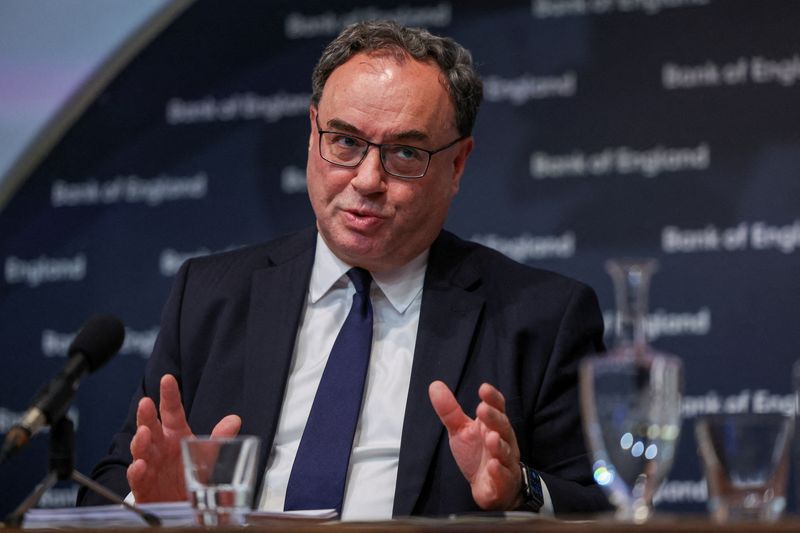LONDON (Reuters) - Britain's economy is so far proving resilient to higher interest rates, but it will take time for the full impact of the climb in borrowing costs to feed through, the Bank of England said in its half-yearly Financial Stability Report on Wednesday.
Following are highlights of remarks by BoE Governor Andrew Bailey and other senior BoE officials at a press conference to present the report.
BOE GOVERNOR BAILEY ON INTEREST RATE RISK
"The UK economy and financial system has so far been resilient to interest rate risk."
"The FPC will remain vigilant to these risks and these processes taking effect."
"It is the case that elements of the global financial system do remain vulnerable to increased interest rates and uncertainty surrounding the economic outlook, and of course tensions geopolitically speaking."
"We will continue to monitor credit conditions for any signs of tightening which are not explained satisfactorily by changes in the macroeconomic outlook."
BAILEY ON LABOUR MARKET
"The current level of pay increases are not consistent with inflation targets. I mean that's, I'm afraid, you know, a fact of life, and we have to deal with that."
"I think there are some interesting pieces of evidence (in labour market data) ... it's a continuation in some cases, if you look at the vacancy to unemployment ratio, for instance, of some signs of the labour market cooling."
BOE'S BAILEY ON HOUSEHOLD STRESS
"We have a much stronger labour market ... it is helping a lot in terms of the stress that households are seeing."
BOE'S BAILEY ON THE BANKING SYSTEM
"The resilience of the banking system is not a constraint on banks managing their net interest margins, and therefore managing the rates they pay to savers and the rates they charge on mortgages."
"It is also important that we have competition in the banking system, which encourages banks to compete and compete on saving rates. And again, just to re-emphasise a more resilient banking system will be able to compete."
"In constructing the scenario for the banks stress test, we do look more broadly than just the core UK markets.
"We've obviously once again had to think quite carefully, for instance, about risks in China and Hong Kong, because obviously our major banks are very active in those markets, much more so than other major banking sectors elsewhere."
BAILEY ON DEPOSIT GUARANTEES
"The answer is not to raise the 85,000 (pounds) limit in this case. In a way that was one of the lessons from Silicon Valley UK."
"If we put it up from 85,000 to some other number that's larger than 85,000 that doesn't really do it. So we are looking, as I said, you know, more broadly at the resolution toolkit."
BAILEY ON LDI FUNDS
"We've essentially sort of set what we think is the sensible buffer level for them to hold as a buffer against stress. What that meant was that when interest rates went up, there was no disorderly need to ... try to call down assets to recapitalize the LDI funds."
BAILEY ON CREDIT SUISSE
"There was a resolution on Credit Suisse (SIX:CSGN) let's be clear on that. It wasn't a resolution that followed the playbook exactly."
"There were doubts cast on the globally significant bank resolution plans more broadly by virtue of not using the playbook and deciding that the playbook couldn't be used."
"That's a very serious issue... We can't live with a world where there's ambiguity that's just not of course, acceptable, the risk is much too great."
BOE'S JON CUNLIFFE ON HOUSEHOLD DEBT
"I think the big difference is that the amount of household debt, that's being carried, is much lower now than it was at the time of the financial crisis. So households aren't really over levered as they were before."
On interest rate cycles: "This one has been fast by historical standards, but in terms of the amplitude of the cycle, actually not so very different."
On money markets: "We've got improvements on money market funds, where in the UK they will be putting out our proposals later on. There will be proposals coming, I hope on margin."

BOE'S SAM WOODS ON HOUSING MARKET
"On the smaller landlords point, we're not very concerned by that from a financial stability point of view."